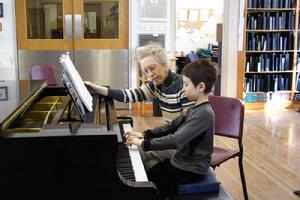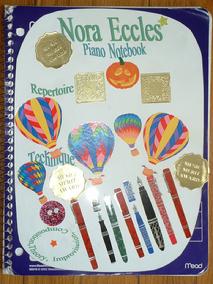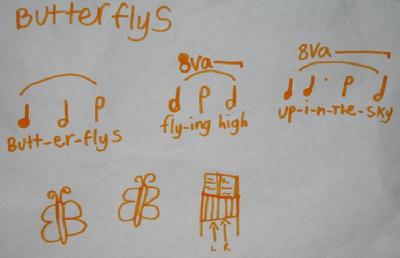Piano Lessons for Children

Generally, age 8 is a good time to begin piano lessons. Beginning later than age 8 is also fine, of course. Families need to have a piano in their homes for practice. Lessons can be either 45 minutes or one hour. Study includes reading music (notes and rhythm), learning repertoire pieces both from reading a music score and by copying the teacher's examples, technical exercises, regular sight-reading activities, and music theory. Composition and improvisation are included in the curriculum, and are much more accessible than many people realize. Musical styles taught include classical, jazz, ragtime, pop, and choices of repertoire are influenced by student, parents and teacher.
Lessons are taught either at St. Columba's Church, 4201 Albemarle Street, or at my home, 3651 Veazey Street, NW, Washington, DC., or via Zoom. The Veazey Street studio has a 9' Steinway piano and St. Columba's has Steinway and Yamaha instruments. Both locations are metro-accessible.
During the year, two recitals take place and are ordinarily held in the Music Room at St. Columba's, which has a lovely 7' Yamaha piano and outstanding acoustics. These recitals, which are a blend between formal and less formal are wonderful opportunities for students to share the music resulting from practice. Families are encouraged to bring a small snack to share after the music. The season includes various themed recitals such as a "Family and Friends" recital in which students team up with musical family members - always with some fun and unexpected combinations - and a "Story Recital," performed by the younger students. Recitals are livestreamed to be enjoyed by friends and relatives who live far away.

Some special events that have taken place include dramatized student piano performances of Peter and the Wolf by Prokofiev, The Empty Pot by Demi, and Snake and Friends and The Tiger's Tale by Diane Heath. Seymour Bernstein's collection, Birds, was presented by the students along with art work created by students in a workshop lead by artist, Bill Rock. Families are strongly encouraged to create performing opportunities at home, church or synagogue, schools, retirement communities or other places.
PRACTICING:

My philosophy is that students need to come to their practice out of love and enthusiasm for their music and their playing. Still, a daily habit of practice needs to be developed by students and supported by parents. Just as many families make shared meal time a priority, the importance of daily time at the piano needs to hold a place in each day's routine.
Very young students should spend time at the piano every day - one or more times per day - going through their assignment sheet. As students become more mature, they keep track of practice time in a log. The studio's minimum required practice time is 30 minutes six days per week (except for very young beginners). Students who are very serious about music will need to exceed these norms to meet their goals.
Some child-parent combinations will delight in working together on a daily basis. Other parent-child teams may enjoy sitting down together once or twice a week to play duets or look at assignment material together. There will be other familial combinations who will not work together at all. However, even parents whose assistance is not needed at the keyboard might be of help structuring practice time, making sure fingernails are short, and certainly will be appreciated as cheerleaders. Each family will need to experiment to discover the right solution. Please e-mail me or telephone anytime questions arise about practicing.
EQUIPMENT NEEDED:
- A well-maintained piano
- Short fingernails
- Music books, as assigned
- A bag in which to keep these items
- A metronome, or metronome app. Look for one with a soft, wood-block sound if possible. Avoid metronomes linked with time signatures, or do not use that setting.
- A recording device or app is very useful
- Students need to take responsibility for bringing the materials to lessons.
